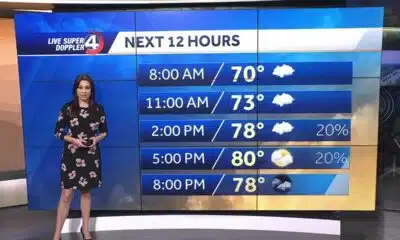News from the South - Missouri News Feed
Bill would increase Missouri secretary of state’s role in initiative petition process
by Natanya Friedheim, Missouri Independent
April 2, 2025
In the spring of 2023, efforts were underway to put the question of restoring abortion access to Missouri voters. Abortion-rights supporters geared up to collect the roughly 171,000 signatures required to put a constitutional amendment on the ballot.
Per the state’s initiative petition process, then-Secretary of State Jay Ashcroft wrote a summary of their proposed constitutional amendment. A staunch abortion opponent then running for governor, Ashcroft drafted the first part of his summary of the petition to say: “Do you want to amend the Missouri Constitution to: allow for dangerous, unregulated, and unrestricted abortions, from conception to live birth.”
It was not what the drafters had in mind. They took him to court — and won.
A judge nixed Ashcroft’s summary and wrote a new one.
A Republican-sponsored bill that has cleared the state Senate and received a House committee hearing Tuesday would make it more difficult for judges to rewrite a secretary of state’s ballot summary.
“To me this is a gross overstepping of the judiciary branch,” state Sen. Rick Brattin, a Harrisonville and the bill sponsor, said at Tuesday’s hearing.
In Brattin’s opinion, shared by opponents to abortion rights, the courts wrote a summary slanted in favor of the initiative petition that would become Amendment 3, ultimately passed by voters last November.
Senate Bill 22 allows a group to appeal the secretary of state’s summary. The court can make recommendations, but the secretary of state must revise the language within seven days
If the court finds that summary unfair, the secretary gets five days to write another draft. This process can happen one last time, and upon third revision the secretary gets just three days. Only then, if the court still finds the summary unfair, can a judge rewrite it. The back-and-forth process must take place on a set timeline prior to the general election.
Brattin’s original bill eliminated the court’s ability to rewrite a ballot summary, he said at the committee hearing, but he worked with Senate Democrats to amend it.
“This was (a) compromise,” Brattin said.
For opponents of the bill, the timeline would make it nearly impossible to oppose the secretary of state’s ballot language. The process would need to play out more than 70 days before the election.
“If the time runs out, the challenge is extinguished, and it seems to me like whatever the last language is would stand, even if the court still thinks it’s not fair,” said state Rep. Eric Woods, a Kansas City Democrat.
Sam Lee, a veteran anti-abortion lobbyist, argued courts can expedite cases related to an election. He spoke on behalf of Campaign Life Missouri and testified in support of the measure along with a representative from Missouri Right to Life.
Groups including the League of Women Voters of Missouri, the American Civil Liberties Union of Missouri, the Missouri Voter Protection Coalition, Missouri Jobs with Justice Voter Action and the Missouri AFL-CIO testified in opposition to the measure. Many voters echoed Woods’ concerns about the feasibility of the proposed timeline.
“What if today our Secretary of State was a Democrat?” asked Ron Berry, a lobbyist for Missouri Jobs with Justice and a former staffer for Democratic Secretary of State Robin Carnahan. “Would we be here today discussing this bill?”
This story originally appeared in the Columbia Missourian. It can be republished in print or online.
Missouri Independent is part of States Newsroom, a nonprofit news network supported by grants and a coalition of donors as a 501c(3) public charity. Missouri Independent maintains editorial independence. Contact Editor Jason Hancock for questions: info@missouriindependent.com.
The post Bill would increase Missouri secretary of state’s role in initiative petition process appeared first on missouriindependent.com
News from the South - Missouri News Feed
Urban League's back-to-school expo helps thousands of St. Louis students in need
SUMMARY: The Urban League’s back-to-school expo in St. Louis provided crucial support to thousands of students in need. Held in a drive-thru format, the event served up to 5,000 families, distributing nearly $400,000 worth of school supplies, food, groceries, toiletries, PPE, and tornado disaster relief items. Sponsored by Nike and community partners, the expo ensured children had essential tools to start the school year strong, especially important after recent severe weather devastation. Volunteers efficiently loaded supplies into cars to ensure safety and accessibility. A follow-up event on August 16 will offer free health services including exams, immunizations, and screenings.
Thousands of students get a big boost ahead of the new school year as the Urban League of Metropolitan St. Louis’ back-to-school expo returned this weekend.
St. Louis News: FOX 2 covers news, weather, and sports in Missouri and Illinois. Read more about this story or see the latest updates on our website https://FOX2Now.com
Follow FOX 2 on social media:
YouTube: https://www.youtube.com/FOX2Now
Facebook: https://www.facebook.com/FOX2Now/
Twitter: https://twitter.com/FOX2Now/
Instagram: https://www.instagram.com/fox2now/
TikTok: https://tiktok.com/@fox2now
SnapChat: https://www.snapchat.com/add/fox2now
News from the South - Missouri News Feed
Here's what Yadier Molina said on his first game as a Cardinals coach
SUMMARY: Yadier Molina, the St. Louis Cardinals’ legendary catcher, returned to Busch Stadium as a guest coach for the first time since retiring three years ago. Serving for two games against the Chicago Cubs, Molina is providing moral support and sharing his expertise with catchers and pitchers to refine their skills during the 2025 season’s final months. He expressed joy in returning home, appreciating the fans and the opportunity to mentor young players. Manager Oli Marmol and catchers Yohel Pozo and Pedro Pages praised Molina’s presence and impact. Molina also revealed aspirations to manage or coach at the major league level in the future.
The post Here's what Yadier Molina said on his first game as a Cardinals coach appeared first on fox2now.com
News from the South - Missouri News Feed
Local movie: Catching Bullets
SUMMARY: “Catching Bullets” is a powerful new documentary addressing youth gun violence in St. Louis, following community leaders and mentors working to break the cycle. The film centers on former gang member Darren Seals, who survived multiple shootings and now dedicates his life to helping at-risk youth find constructive paths. It highlights gun violence as the leading cause of death for Black males in St. Louis and emphasizes the need for community-driven change. Premiering locally on the 14th and streaming nationally on Tubi and Amazon Prime, the film aims to inspire hope, healing, and a return to caring community values.
Thursday, August 14th 24:1 Cinema
6755 Page Avenue
Pagedale, Mo 6:30 p.m.
-
Mississippi Today6 days ago
After 30 years in prison, Mississippi woman dies from cancer she says was preventable
-
News from the South - Texas News Feed6 days ago
Texas redistricting: What to know about Dems’ quorum break
-
News from the South - North Carolina News Feed4 days ago
Two people unaccounted for in Spring Lake after flash flooding
-
News from the South - Florida News Feed7 days ago
Warning for social media shoppers after $22K RV scam
-
News from the South - Georgia News Feed6 days ago
Georgia lawmakers to return this winter to Capitol chambers refreshed with 19th Century details
-
Mississippi Today5 days ago
Brain drain: Mother understands her daughters’ decisions to leave Mississippi
-
News from the South - Louisiana News Feed6 days ago
Plans for Northside library up for first vote – The Current
-
Local News Video6 days ago
Sparklight offers free backpacks and school supplies to Coast kids











































